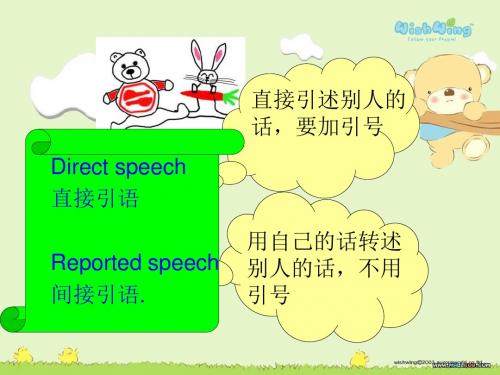直接引语变间接引语课件
合集下载
直接引语变间接引语-公开课37页PPT

43、重复别人所说的话,只需要教育; 而要挑战别人所说的话,则需要头脑。—— 玛丽·佩蒂博恩·普尔
44、卓越的人一大优点是:在不利与艰 难的遭遇里百折不饶。——贝多芬
45、自己的饭量自己知道。——苏联
直接Байду номын сангаас语变间接引语-公开课
41、实际上,我们想要的不是针对犯 罪的法 律,而 是针对 疯狂的 法律。 ——马 克·吐温 42、法律的力量应当跟随着公民,就 像影子 跟随着 身体一 样。— —贝卡 利亚 43、法律和制度必须跟上人类思想进 步。— —杰弗 逊 44、人类受制于法律,法律受制于情 理。— —托·富 勒
45、法律的制定是为了保证每一个人 自由发 挥自己 的才能 ,而不 是为了 束缚他 的才能 。—— 罗伯斯 庇尔
41、学问是异常珍贵的东西,从任何源泉吸 收都不可耻。——阿卜·日·法拉兹
42、只有在人群中间,才能认识自 己。——德国
44、卓越的人一大优点是:在不利与艰 难的遭遇里百折不饶。——贝多芬
45、自己的饭量自己知道。——苏联
直接Байду номын сангаас语变间接引语-公开课
41、实际上,我们想要的不是针对犯 罪的法 律,而 是针对 疯狂的 法律。 ——马 克·吐温 42、法律的力量应当跟随着公民,就 像影子 跟随着 身体一 样。— —贝卡 利亚 43、法律和制度必须跟上人类思想进 步。— —杰弗 逊 44、人类受制于法律,法律受制于情 理。— —托·富 勒
45、法律的制定是为了保证每一个人 自由发 挥自己 的才能 ,而不 是为了 束缚他 的才能 。—— 罗伯斯 庇尔
41、学问是异常珍贵的东西,从任何源泉吸 收都不可耻。——阿卜·日·法拉兹
42、只有在人群中间,才能认识自 己。——德国
直接引语变间接引语[课件]
![直接引语变间接引语[课件]](https://img.taocdn.com/s3/m/4d29a028453610661ed9f417.png)
• →He
I often him sing .
• Mother said to me, “Can you go shopping with me?”
• →Mother me
I go shopping with
.
• Tom asked, “Lucy, did you hand in your homework?”
1、直接引语如果是陈述句,变为间接引语时注意: ①不用引号,而用连接词that,但有时可省略。 ②人称作相应变化; ③主句里的动词如果是过去时,在间接引语中作相应改变:
如:He says,"I am from the USA.” →He says that he is from the USA. Mr Smith said to his girl friend,“ I haven’ t seen
→Lily asked Miss Green if it was made in China. 3、直接引语如果是特殊疑问句,变为间接引语时,需用疑
问词引导, 词序是:连词+主语+谓语。 Lucy said to me, “How can I help?” →Lucy asked me how she could help. 4、直接引语如是祈使句,变间接引语时,须变为动词不定 式,并在动词不定式前用tell, ask, order. He said to the boy,“ Come here,young man! ” →He asked the boy to go there.
• 1.She said to me, “I broke your CD player.” • →She told me that she had broken my CD
直接引语变间接引语讲解课件

转换的基本原则
准确转述
用自己的语言准确转述 说话人的意思,不改变
原意。
调整时态
根据上下文语境,调整 时态以符合整体语境。
调整人称
根据需要,将直接引语 中的第一人称或第二人
称转换为第三人称。
去除无关细节
去除直接引语中与主要 信息无关的细节,使转
述更加简洁明了。
02
CATALOGUE
直接引语变间接引语的步骤
标点符号的转换
01
直接引语中的冒号和双引号需转 换为间接引语中的逗号和单引号 。
02
例如:“I will go to the park tomorrow.” -> He said that he would go to the park the next day.
人称代词的转换
直接引语中的第一人称代词需转换为 第三人称代词。
详细描述
在直接引语转变为间接引语的过程中,标点符号的使用需要特别注意。例如, “他说‘我明天去北京’”应该使用逗号变为“他说,明天他要去北京”。
语序混乱
总ቤተ መጻሕፍቲ ባይዱ词
在将直接引语转变为间接引语时,语序 混乱也是一个常见错误。
VS
详细描述
在直接引语中,原话的语序可能是倒装、 前置等,但在转变为间接引语时,需要按 照正常的语序进行排列,以保持句子的通 顺性和逻辑性。例如,“明天你去北京吗 ?”应该转变为“他问是否明天去北京” 。
04
CATALOGUE
练习与巩固
单句改写
详细描述:从简单的单句开始练 习,逐步掌握直接引语变间接引 语的规则和技巧,如时态、语序 、人称等方面的变化。
例子
原句:他说:“我喜欢吃苹果。 ”
直接引语变间接引语讲解课件

5.The teacher said, "My son had the same experience as the little boy." The teacher said that his son had __ the same experience as the little boy. A. been B. have C. had D. done
9.The student said to me, "She has made a close study of the problem." The student told me that she __ a close study of the problem. A. has make B. have made C. had make D. had made
④直接引语如果是一般现在时。表示一种反复出现或 习惯性的动作,变间接引语,时态不变。如: He said, “I get up at six every morning。” →He said he gets up at six every morning.
⑤如果直接引语中的情态动词没有过去时的形式不再 变 (例:could, should, would, might) The doctor said, “You should stay in bed for 2 days.” → The doctor said I should stay in bed for 2 days.” 和已经是过去时的形式时, 例: ought to, had better, used to Peter said. "You had better come here today."
直接引语转间接引语ppt课件

→ The boy told us that he usually gets up at six every
morning.
1.The interviewer asked Detective Lu , ‘Why did you become a detective last year?’ The interviewer asked Detective Lu why he had become a detective the year before.
2.‘Where did you go two days ago?’ Lily asked Lucy. Lily asked Lucy where she had been two days before.
3.‘Will you go to see a film with me tomorrow?’ Sam asked Dick. Sam asked Dick whether/if he would go to see a film with him the following day/the next day.
直接引语转间接引语
1、时态变化:
2、人称变化:一主、二宾、三不变
3、时间状语和地点状语变化 4、指示代词、情态动词 5、 句子类化:
一般现在时 现在进行时 一般将来时
一般过去时 过去进行时 过去将来时
现在完成时
过去完成时
一般过去时
过去完成时
10.‘Light travels faster than sound.’ said the teacher. The teacher said that light travels faster than sound.
1. She said to Tom, ‘Can you help me?’ 2. She asked, ‘Is this book yours or his?’ 3. The teacher asked, ‘how did you repair it?’ 4. The teacher said to the students, ‘Don’t waste your time.’ 5. The mother said, ‘Tom, get up early, please.’ 6. ‘Will you go to the concert with me this evening?’ Mary asked me. 7. ‘What did you do yesterday?’ the old man asked my brother. 8. The engineer said, ‘I was at college in 1967.’ 9. ‘Where does your chemistry teacher live, Karen?’ the young man asked. 10. ‘Why were you late yesterday morning?’ His teacher asked.
morning.
1.The interviewer asked Detective Lu , ‘Why did you become a detective last year?’ The interviewer asked Detective Lu why he had become a detective the year before.
2.‘Where did you go two days ago?’ Lily asked Lucy. Lily asked Lucy where she had been two days before.
3.‘Will you go to see a film with me tomorrow?’ Sam asked Dick. Sam asked Dick whether/if he would go to see a film with him the following day/the next day.
直接引语转间接引语
1、时态变化:
2、人称变化:一主、二宾、三不变
3、时间状语和地点状语变化 4、指示代词、情态动词 5、 句子类化:
一般现在时 现在进行时 一般将来时
一般过去时 过去进行时 过去将来时
现在完成时
过去完成时
一般过去时
过去完成时
10.‘Light travels faster than sound.’ said the teacher. The teacher said that light travels faster than sound.
1. She said to Tom, ‘Can you help me?’ 2. She asked, ‘Is this book yours or his?’ 3. The teacher asked, ‘how did you repair it?’ 4. The teacher said to the students, ‘Don’t waste your time.’ 5. The mother said, ‘Tom, get up early, please.’ 6. ‘Will you go to the concert with me this evening?’ Mary asked me. 7. ‘What did you do yesterday?’ the old man asked my brother. 8. The engineer said, ‘I was at college in 1967.’ 9. ‘Where does your chemistry teacher live, Karen?’ the young man asked. 10. ‘Why were you late yesterday morning?’ His teacher asked.
直接引语变间接引语PPT

1.She said, “ I often go to the beach on Sunday.”
that ______ she often ______ went to the beach … She said ______ ______ 2. He said to me, “ Are you learning dancing?” asked me ______ if ______ I was He _____ _______ learning dancing. 3. Mr Zhang said, “Light travels faster than sound.” that light ______ travels faster than sound. Mr Zhang said _____ 4. “Where does Linda come from?” she asked. Linda ______ came from. She asked where ______ ______ 5.Our teacher said to us, “ Come to school early.” to come to school early. Our teacher told ______ us ______ ______
6. Does Mr. Brown enjoy living in China? Could you tell us? if Mr. Brown _______ enjoys living in →Could you tell us _____ China? 7. "Does the girl need any help?” he asked me. if the girl _________ needed some help. →He asked me ______ 8. When does the train leave? I want to know. when the train _________. leaves → I want to know _________ 9. Did Peter come here yesterday? Li Lei wants to know. if came → Li Lei wants to know _________ Peter _________ here yesterday. 10. .How does he get on with his new classmates? Could you tell me? he gets on with ______ his → Could you tell me how ______ _____ new classmates?
直接引语变为间接引语ppt课件

直接引语为一般疑问句时,间接引语中用 whether或if引导;直接引语为特殊问句时,间 接引语中仍用原来的疑问词。
从使用情况来看,闭胸式的使用比较 广泛。 敞开式 盾构之 中有挤 压式盾 构、全 部敞开 式盾构 ,但在 近些年 的城市 地下工 程施工 中已很 少使用 ,在此 不再说 明。
For example:
For example: 1. "Open the door,please."She said.
She asked me to open the door.
2. It says,"No smoking here." It told us not to smoke there.
从使用情况来看,闭胸式的使用比较 广泛。 敞开式 盾构之 中有挤 压式盾 构、全 部敞开 式盾构 ,但在 近些年 的城市 地下工 程施工 中已很 少使用 ,在此 不再说 明。
时态的变化
当主句是过去时时,从句要得变为相应的过去时态, 变化规律如下:
一般现在时—— 一般过去时 一般过去时—— 过去完成时 一般将来时—— 过去将来时 现在进行时—— 过去进行时 现在完成时—— 过去完成时 过去完成时—— 过去完成时(时态不变) 过去进行时—— 过去进行时(时态不变)
从使用情ቤተ መጻሕፍቲ ባይዱ来看,闭胸式的使用比较 广泛。 敞开式 盾构之 中有挤 压式盾 构、全 部敞开 式盾构 ,但在 近些年 的城市 地下工 程施工 中已很 少使用 ,在此 不再说 明。
English teacher. 另外注意直接引语为复数,引述者主语为单数,间接引语主语相应变复
数。如: He said,“Are you interested in English?”→He asked me/us if I
从使用情况来看,闭胸式的使用比较 广泛。 敞开式 盾构之 中有挤 压式盾 构、全 部敞开 式盾构 ,但在 近些年 的城市 地下工 程施工 中已很 少使用 ,在此 不再说 明。
For example:
For example: 1. "Open the door,please."She said.
She asked me to open the door.
2. It says,"No smoking here." It told us not to smoke there.
从使用情况来看,闭胸式的使用比较 广泛。 敞开式 盾构之 中有挤 压式盾 构、全 部敞开 式盾构 ,但在 近些年 的城市 地下工 程施工 中已很 少使用 ,在此 不再说 明。
时态的变化
当主句是过去时时,从句要得变为相应的过去时态, 变化规律如下:
一般现在时—— 一般过去时 一般过去时—— 过去完成时 一般将来时—— 过去将来时 现在进行时—— 过去进行时 现在完成时—— 过去完成时 过去完成时—— 过去完成时(时态不变) 过去进行时—— 过去进行时(时态不变)
从使用情ቤተ መጻሕፍቲ ባይዱ来看,闭胸式的使用比较 广泛。 敞开式 盾构之 中有挤 压式盾 构、全 部敞开 式盾构 ,但在 近些年 的城市 地下工 程施工 中已很 少使用 ,在此 不再说 明。
English teacher. 另外注意直接引语为复数,引述者主语为单数,间接引语主语相应变复
数。如: He said,“Are you interested in English?”→He asked me/us if I
英语:直接引语变间接引语课件

随 称变间引后与主 “ you must get she must get up
宾 句宾语的人称保 up early”
Hale Waihona Puke early持一致第三 人称 不用 变
引号内的第三人 称在变间引后去人 称不变
She said to me , “ They want to help him”
She told me that they wanted help him
4. This morning he said,” I’m leaving for Beijing tomorrow.” This morning he said that he was leaving for Beijing tomorrow.
直接引语转为间接引语时,下列情况下时态不变
1. 直接引语若表示的是客观事实或真理时, 变间接引语时时态不变.
Direct speech and Indirect speech
He says,“I leave my book in your room” He said that he left his book in your room.
直接引语: 直接引述别人的原话 间接引语: 用自己的话转述别人的话
间接引语在多数情况下构成宾语从句
5. He said, “they are playing games over there?” He said that they___w__e_re_ playing games over there.
直接引语时态 一般现在时 现在进行时 现在完成时 一般过去时 过去完成时 一般将来时
间接引语时态 一般过去时 过去进行时 过去完成时 过去完成时 不变 过去将来时
直接引语变间接引语讲解ppt

She asked me
Whether / if I was ready.
4. 直接引语是祈使句变为间接引语的方法 间接引语应改为 “tell (ask, order等) sb (not) to do sth.”句型。 She said, “ Don’t talk.” She asked the children not to talk.
2.特殊疑问句直接引语变间接引语 When do you have math? ( They asked him )
陈述句语序(即主语在前,谓语在后)
you have math
They asked him when
you have math. he had
They asked him when he had math.
Are you a teacher? ( They asked him )
you are a teacher
They asked him Whether/if you are a teacher.
he was They asked him whether he was a teacher.
“Are you ready?”
• • • • • • • • • • • • • • • here • over here • tonight • now • today • yesterday • tomorrow • last week/month/year… • next week/month/year…• …ago • the day after tomorrow • this • these • come • bring • there over there that night then that day the day before the next day the week/moth/year…before… the next week/month/year… …before two days later that those go take
相关主题
- 1、下载文档前请自行甄别文档内容的完整性,平台不提供额外的编辑、内容补充、找答案等附加服务。
- 2、"仅部分预览"的文档,不可在线预览部分如存在完整性等问题,可反馈申请退款(可完整预览的文档不适用该条件!)。
- 3、如文档侵犯您的权益,请联系客服反馈,我们会尽快为您处理(人工客服工作时间:9:00-18:30)。
Listen to 1a, answer the questions.
2/1
(录音p25-1a)
Kangkang: “It’s a beautiful place with lots of flowers and grass.”
What did Kangkang say about the West Hill in the past? Kangkang said that it was a beautiful place with flowers and grass.
Kangkang: “The flowers and grass have gone!” What did Kangkang say about the West Hill at present? Kangkang said that the flowers and grass had gone.
直接引语: 妈妈说:” 杰克是个好工人“. Direct speech: Mother said :”Jack is a good worker.” 间接引语 妈妈说杰克是个好工人。 Indirect speech: Mother said that Jack was a good worker
→Peter said I had better go there that day.
三、如何变句型:
2/4
①直接引语如果是陈述句,间接引语应改为由that引导 的宾语从句。 She said, "Our bus will arrive in five minutes.“ →She said that their bus would arrive in five minutes. ②直接引语如果是反意疑问句,选择疑问句或一般疑问句, 间接引语应改为由 whether或if引导的宾语从句. He said, "Can you swim, John?“ →He asked John if he could swim。 “Do you go to school by bus or by bike?” →He asked me if I went to school by bus or by bike. ③直接引语如果是特殊问句,间接引语应该改为由疑问代词或疑 问副词引导的宾语从句(宾语从句必须用陈述句语序)。 She asked me, "When do they have their dinner?” → She asked me when they had their dinner. She asked me, "What was Jack doing when I come in?” →She asked me what Jack was doing when she came in.
我还有话说!!!
直接引语变为间接引语的转化中还需要注意 下列的词语变化!!! 指示代词 this that these those 表示时间的词 now then today that day yesterday the day before last week(month ,etc.) the week(month ,etc.) before three days (a year ,etc.) ago three days (a year. etc.) before tomorrow the next (following ) day next week (month,etc.) the next (following ) week (month,etc.) 表地点的词 Here there 动词 bring take come go
Retell the questions like this: Kangkang asked Mrs. Zhou …
What’s wrong with you? Kangkang asked Mrs. Zhou what was wrong with her.
直接引语变为间接引语时: 如果直接引语是陈述句,则变为say引 导的宾语从句;如果直接引语是疑问 句, 则变为ask引导的宾语从句。同时 要注意当主句是一般过去时时,从句 的时态也要相应的变为过去的某种时 态。还要注意人称呦!!
直接引语变间接引语
1/1
What can you see in the picture?
Can you see bees and butterflies dancing?
Is the West Hill a beautiful place ?
Is the West Hill a beautiful place now? What has happened here? The flowers and grass have gone! There are several chemical factories pouring waste water into the stream.
“二随宾”是指直接引语变间接引语时 ,若从句中的主语及宾语是第二人称或 被第二人你所修饰。从句中的人称要跟 引号外的主句的宾语一致。如果引号外 的主句没有宾语。也可以用第一人称, 如:
He said to Kate. "How is your sister now?” →He asked Kate how her sister was then。
2/2
一、如何变人称: 口诀:一随主。二随宾,第三不变。
• “一随主”是指在直接引语变间接引语时,如果从 句中的主语是第一人称或被第一人称所修饰。从 句中的人称要按照主句中主语的人称变化如: • She said. "My brother wants to go shopping with me. ” • →She said her brother wanted to go shopping with her.
四、如何变状语: 2/5 ago—before; this morning—that 直接引语变间接引语,状语变化有其内在规律, morning 时间状语由“现在”改为“原来” Yesterday—the day before; tomorrow —the next (例:now变为then, yesterday 变为 the day day before week—the following week/the today变为 that day next next week He said, ”I want to goYesterday swimming now. ” morning morning —the → He said he wanted tobefore go swimming then. 地点状语,尤其表示方向性的, here 变 there The teacher said 谓语动词的变化 : ,“ You should come here at 7:00.” →The teacher said I should go there at 7:00. 直接引语:Must ;Come ;bring 指示代词修饰的状语,由“此”改为“彼” 间接引语 :hadthat to; go ;take 例:this 改为 He said, "This books is here mine.“ She said," I will come this evening.” →He said that book was his. She said that she would go there that evening
2/3
(4) 现在完成时变为过去完成时 (5) 一般过去时变为过去完成时
注意:以下几种情况时态 不变 ①直接引语是客观真理。 The teacher said "The earth moves around the sun .” → The teacher said me the earth moves around the sun earth. ②直接引语是过去进行时,时态不变。 Jack said. “I was doing chores when Tom came to see me” Jack said he was doing chores when Tom came to see him. ③直接引语中有具体的过去某年、某月、某日作状语, 变为间接引语时,时态不变。如: Jack said. "I was born on April 2l, 1980." →Jack said he was born on April 21, 1980.
④直接引语如果是一般现在时。表示一种反复出现或 习惯性的动作,变间接引语,时态不变。如: He said, “I get up at six every morning。” →He said he gets up at six every morning.
⑤如果直接引语中的情态动词没有过去时的形式不再 变 (例:could, should, would, might) The doctor said, “You should stay in bed for 2 days.” → The doctor said I should stay in bed for 2 days.” 和已经是过去时的形式时, 例: ought to, had better, used to Peter said. "You had better come here today."
④直接引语如果是祈使句,间接引语应改为“ Tell (ask, order, beg等) sb (not) to do sth.”句型 。 如: 1."Don't make any noise," the teacher said to the students. →She told (ordered) the students not to make any noi se. 2.“Open the door, please," said she. →She asked him to open the door. ⑤直接引语如果是以“Let's”开头的祈使句,变为间 接引语时,通常用“suggest +动句词(或从句)” 如: He said, "Let's go to the movies." →He suggested going to the movies. 或He suggested that they should go to see the movies.
